Now that we’ve considered a bunch of the options for interpreting creation in Genesis, we are moving to look at astronomy. In today’s episode Will Barlow moves into his home territory–physics. You’ll learn about the weird nature of light, how particles do strange things at the quantum scale, and how the big bang model actually leads to belief in God. If you’ve ever been curious how to talk to science-minded friends and relatives about belief in God, today’s episode should help!
Listen to this episode on Spotify or Apple Podcasts
See below for notes.
—— Links ——
- We are doing follow-up discussions to these episodes on YouTube. Check them out!
- See other episodes in this Scripture and Science Class
- Check out Barlow’s previous podcast episodes
- Learn more about and support the church Barlow and his team are starting in Louisville, KY, called Compass Christian Church
- Find more articles and audios by Barlow on his website: Study Driven Faith
- Support Restitutio by donating here
- Designate Restitutio as your charity of choice for Amazon purchases
- Join our Restitutio Facebook Group and follow Sean Finnegan on Twitter @RestitutioSF
- Leave a voice message via SpeakPipe with questions or comments and we may play them out on the air
- Intro music: Good Vibes by MBB Attribution-ShareAlike 3.0 Unported (CC BY-SA 3.0) Free Download / Stream: Music promoted by Audio Library.
- Who is Sean Finnegan? Read his bio here
—— Notes ——
Overview of Modern Physics
• Light
• General Relativity
• Quantum Mechanics
• The Big Bang
Light
• Perhaps the most interesting and necessary to support life
• Comes in many forms
• Can act as a wave or a particle (unique!)
• Light can act like a wave (ex: sound or water)
• Light can act like a particle (ex: basketball)
• Light seems to know the fastest path through a material
• The speed of light is a well-known quantity and is considered the “speed limit of the Universe”
General Relativity
• Has been verified enough to use in everyday items like GPS
• Gravity can bend light and make “impressions” in space-time
Quantum Mechanics
• Useful when talking about microscopic things
• Shows that electrons do not orbit a nucleus like a planet around the Sun
• Gives probabilities for direction and location at any given time
Imagine that you reach your hand out to touch a table:
• On a microscopic level, what you feel as “solid” is actually the electrons in your hand repelling the electrons in the table
• Theoretically, your hand could pass through the table if you could line up the electrons in your hand with the electrons in the table (quantum tunneling)
The Big Bang
• Some ancient pagans (like Aristotle) believed that the Universe always existed — called a “steady state” Universe
• This view is attractive for modern atheists because it does not require a beginning to the Universe
Kalam Cosmological Argument
• John Philoponus of Alexandria (4th century) was a Christian philosopher who argued that the Universe had a beginning
• Islamic philosophers preserved this argument in the Middle Ages
• Jewish scholars brought this back to Europe at the end of the Middle Ages
• Whatever begins to exist has a cause.
• The Universe had a beginning.
• Therefore, the Universe has a cause.
Atheists are motivated to show the Universe did not have a beginning!
The Big Bang
• Alexander Friedmann used Einstein’s theory of general relativity to propose an expanding Universe
• Catholic priest and professional astronomer Georges Lemaitre proposed what would later be called “the Big Bang theory” in 1927 using Einstein’s theory of general relativity and Friedmann’s expanding model
• This basic model is still being tested and tweaked today
• In 1929, Edwin Hubble discovered that far-away stars are “red-shifting” in every direction
• This only makes sense if the Universe is expanding
• If we extrapolate backwards, we end up with a fixed point at the beginning of the Universe!
• Atheists were quick to propose an alternative solution: what if the Universe was expanding, but matter is continuously created to keep the average density the same?
• This is called the “steady state” hypothesis
• This would allow for an infinitely old Universe
• In the 1960s, Arno Penzias and Robert Wilson discovered the “cosmic microwave background radiation”
• If you point a radio telescope at the space between stars, you will hear faint interference
• This demonstrated that the Universe was formerly more dense than now, which refutes the steady state hypothesis
In basic terms, what does the Big Bang theory say?
• The Universe began approximately 13.7 billion years ago
• Space and matter have been expanding and cooling since then
What is the current state of the Big Bang?
• We will never be able to travel back in time to observe the beginning
• Physicists used high-energy collisions to test hypotheses related to the Big Bang
• There is a physical restriction on understanding the first moment of the Big Bang
Are there viable alternatives to the Big Bang?
• Oscillating universe — Universes expand and contract until the right one pops out
• Multiple Universes — Infinite number of Universes exist beyond our ability to observe them
• Inflationary models
• Hawking’s theory
William Lane Craig on Alternatives
Oscillating Model:
• Violates the laws of physics (a beginning singularity is inevitable according to general relativity)
• Not enough density in the universe to contract the universe (pg. 114)
• The universe is actually speeding up in its expansion
• Some estimates say that only 100 universes could have existed before this one (does not resolve the problem for atheists) (pg. 115)
Multiple universes (especially one with an eternal mother universe):
• Cannot explain the beginning of the model (a quantum sea of energy is something, not nothing)
• Eventually, all universes would collide together (pg. 117)
Inflationary models:
• One cyclic model is inconsistent with the string theory that it is based on
• Another chaotic inflation model does not resolve the problem of a beginning (pgs. 116-117)
Hawking’s theory:
• Uses imaginary numbers in the equations to describe the universe
• Essentially an attempt to game the equations to remove the origin of the universe (pg. 120)

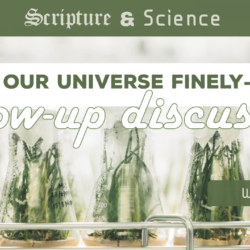
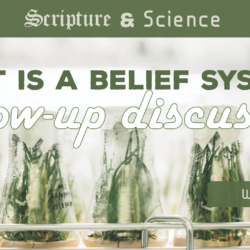
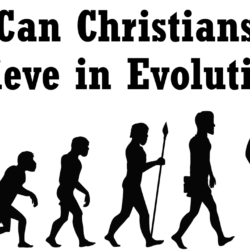
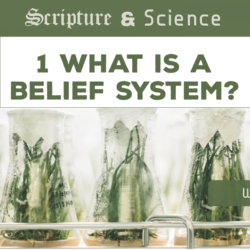

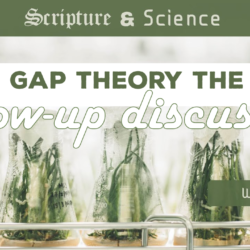
Hi Sean,
I notice when Will mentored stellar parallax in another episode as a method for measuring star distances he never talked about the massive assumption that the earth actually changes position by such an enormous distance every 6 months.
Heliocentric theory has never been proven. A good introduction to the subject is “Des Labor Solis” by Walter Van De Kamp.
Regarding was/became
NIV 1984 footnote
“Or possibly became”
Good find! Thanks for sharing, Peter!
The claim in the podcast that there is no evidence for the speed of light slowing down IS SIMPLY NOT TRUE.
*** EVIDENCE LIGHT IS SLOWING DOWN ***
The speed of light “c” is claimed to be constant by many physicists. The idea that the speed of light is a constant is the chief actor in the “plot” for old earth/universe advocates to claim that the earth and universe are old. But, some notable physicists have been asking for some time now … are constants really constants?
The speed of light within a vacuum being a fixed constant cannot be operationally proved. There are a number of notable physicists who support the view that the speed of light was much faster in the past and has been decaying over time. This understanding of the speed of light is just one of several ways of explaining a YEC view of our universe. “One of the single greatest differences between Young Earth Creationists (YEC) and old earth atheistic Evolutionists, Theistic Evolutionists, Progressive Creationists and Intelligent Design advocates is the issue of time. YECs believe that for both excellent scientific and Biblical reasons the earth and universe are about 6,000 years old.”
Here are some scientific articles (some recent, some older) disputing that the speed of light in a vacuum has been constant over time:
The Decay in the Speed of Light and the truth about Red Shift
https://tinyurl.com/3yycaujd
Does the new much-faster-speed-of-light theory fix the big bang’s problems?
https://tinyurl.com/ynteb5ha
Speed of light slowing down after all?
https://tinyurl.com/htsf95rj
Distant starlight and Genesis: conventions of time measurement
https://tinyurl.com/438y6329
The speed of light is not constant
(Einstein himself continued to question this assumption)
https://physicsdetective.com/the-speed-of-light/
Whether or not the Big Bang can be interpreted as evidence for or against God, here is Real Science Radio’s List of Evidence Against the Big Bang! Theoretical physicist Lawrence Krauss got Bob Enyart and co-host Fred Williams all worked up when he told RSR that, “all evidence overwhelmingly supports the big bang.” In response, we produced this list, which is the web’s highest ranking, most concise, and comprehensive catalog of evidence assessed by many scientists to be inconsistent with the expectations of a big bang origin. There is an immense amount of information at this link. See Lesson 15: Evidence Against the Big Bang at https://scripturalscrutiny.com/2017/04/06/294/